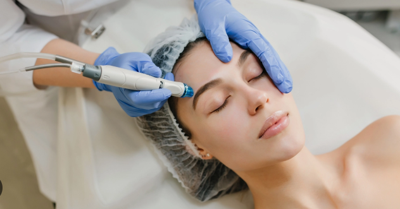
If you’ve spent years perfecting your skincare routine, you’re likely familiar with the big players – retinol, vitamin C, Hyaluronic acid, and sunscreen. But there’s another, often-overlooked ingredient quietly working in the background of countless anti-aging formulations: peptides.
You’ve probably seen them on the labels of serums and creams, but what exactly do they do for your skin? With claims of improving skin texture, reducing fine lines, and enhancing firmness, peptides are a trusted ally in the skincare world, including in professional skincare treatments. They don’t promise instant miracles, but with consistent use, they offer some of the most reliable, science-backed results in the battle against aging.
Understand the Powerhouse
Peptides are short chains of amino acids. As we age, the natural production of proteins declines, contributing to the fine lines and wrinkles. Peptides step in to support the skin’s rejuvenation by signaling the body to produce more of these vital proteins.
These tiny, bioactive molecules can be formulated into skincare products to penetrate the skin's surface and kick-start essential repair processes. The real magic happens when they send signals deep into your skin, prompting cells to perform tasks like synthesizing collagen or repairing damage. Some peptides even act as antioxidants, fighting off free radicals, which are unstable molecules that can speed up the aging process. For those seeking to incorporate peptides effectively, exploring targeted peptide serums and advanced anti-aging formulations like hydrafacial from Skin Results can help enhance skin firmness, improve texture, and maintain a youthful glow.
Integrating It Into Your Routine
Peptides are remarkably easy to incorporate into your skincare routine. You don’t need to overhaul everything; they work well when layered with other anti-aging ingredients. Here’s how you can seamlessly add them to your existing regimen:
Begin with a gentle cleanser to ensure your skin is clean and ready to absorb active ingredients.
Apply a peptide-infused serum while your skin is still damp. The lighter texture allows the peptides to penetrate deeply and work efficiently.
Follow up with a moisturizer to lock in hydration and support the skin barrier, ensuring the peptides are well-protected and your skin stays nourished.
Never forget sunscreen. Sunscreen is essential in any anti-aging routine, as UV exposure can undo all your efforts.
Benefits You Can See and Feel
Collagen is what gives your skin its strength and elasticity, and as you age, it naturally declines. Peptides can stimulate cell regeneration, slowing down this process.
Peptides help to hydrate the skin by supporting the moisture barrier. This is crucial because dehydration can often make fine lines and wrinkles appear more pronounced.
Regular use of peptide-based products can also help reduce redness or inflammation, making your complexion more even and bright.
Choosing Professional Support
While peptides are incredibly effective on their own, some people prefer to use professional treatments to speed up results. Medical-grade skincare options often contain more potent concentrations of peptides and other active ingredients than what’s available over the counter. Working with a dermatologist or licensed aesthetician can help tailor a treatment plan that addresses your specific skin concerns.
If you’re looking for a way to enhance your skin’s resilience against the signs of aging without radically changing your routine, peptides are the perfect solution. They don’t require drastic adjustments or the use of heavy-duty treatments. Instead, by simply adding a peptide serum or cream to your existing skincare regimen, you can support your skin’s ongoing repair and rejuvenation. Think of it as an investment in your skin’s natural ability to regenerate.


(0) comments
We welcome your comments
Log In
Post a comment as Guest
Keep it Clean. Please avoid obscene, vulgar, lewd, racist or sexually-oriented language.
PLEASE TURN OFF YOUR CAPS LOCK.
Don't Threaten. Threats of harming another person will not be tolerated.
Be Truthful. Don't knowingly lie about anyone or anything.
Be Nice. No racism, sexism or any sort of -ism that is degrading to another person.
Be Proactive. Use the 'Report' link on each comment to let us know of abusive posts.
Share with Us. We'd love to hear eyewitness accounts, the history behind an article.